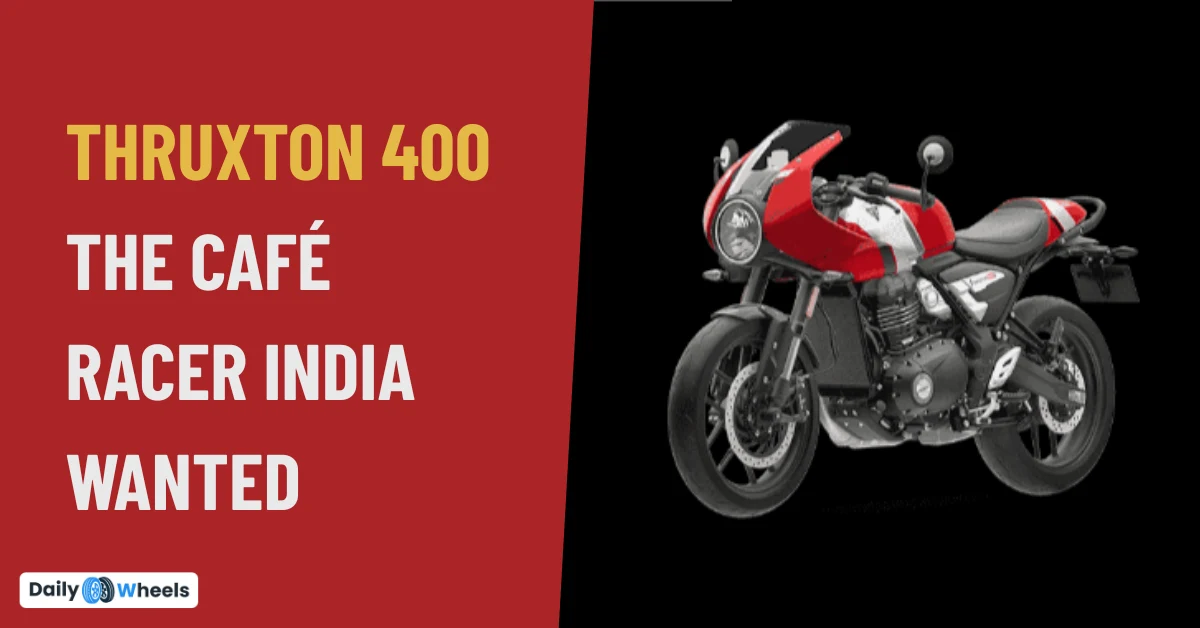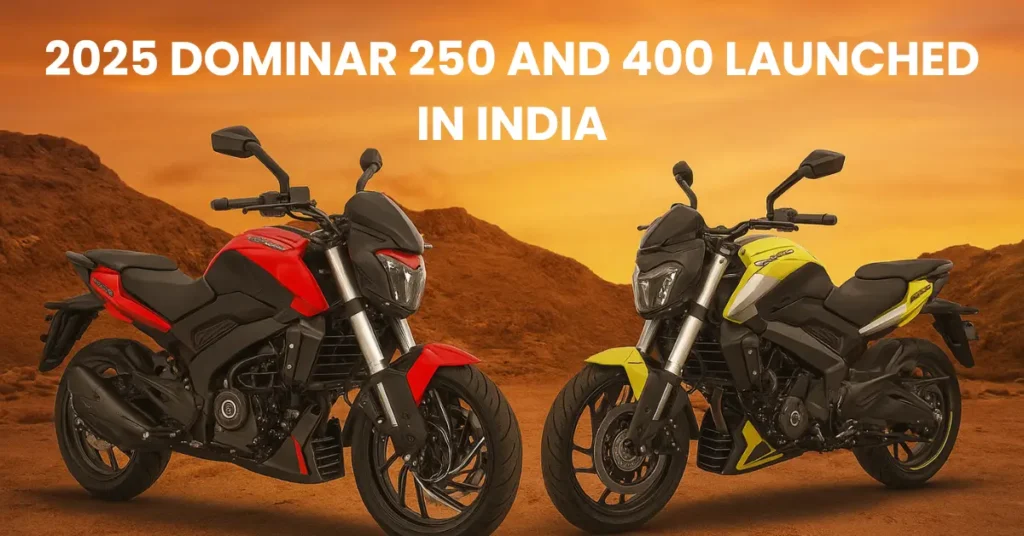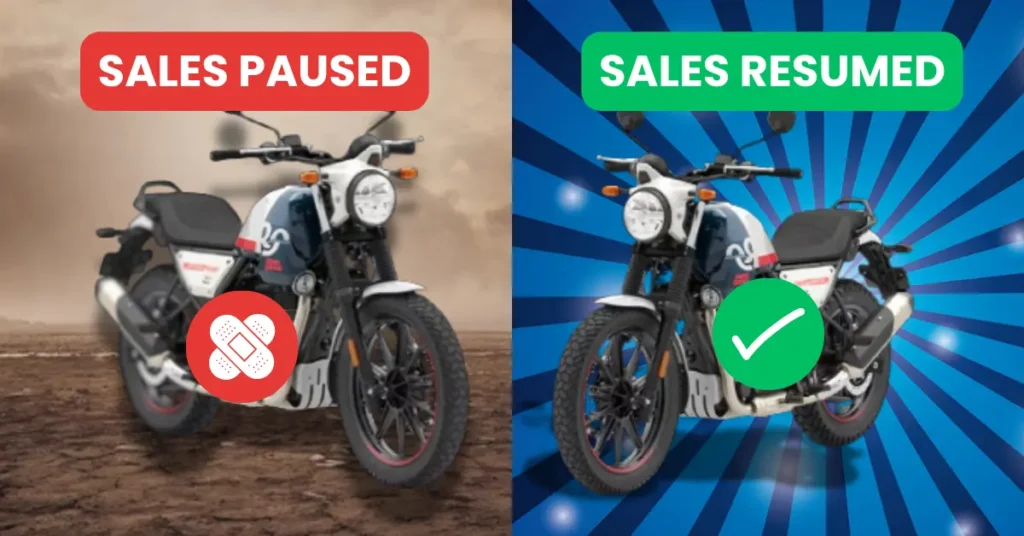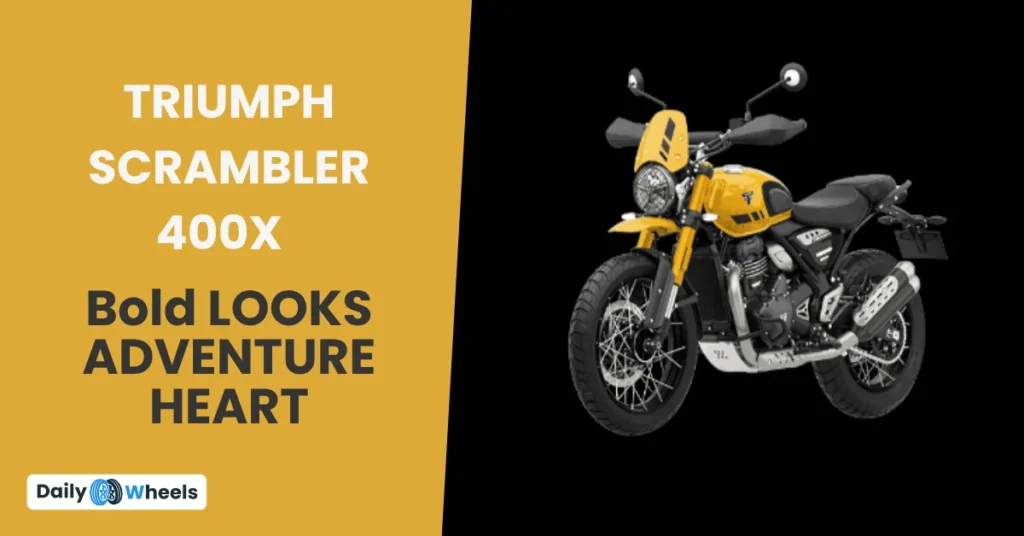Triumph has launched the Thruxton 400 in India as a full-fledged cafe-racer built on its new 400-cc family. Priced at about ₹2.74 lakh (ex-showroom), the Thruxton 400 brings classic Thruxton styling into a lighter, modern and better-equipped package that aims to attract riders who want retro looks without losing modern performance and electronics.
Design and styling: classic Thruxton cues with modern polish
The Thruxton 400 wears the cafe-racer look clearly: a small frame-mounted half fairing, clip-on handlebars, a streamlined teardrop fuel tank, retro side panels and an optional rear seat cowl that completes the solo-rider silhouette. Small details such as bar-end mirrors, a round LED headlamp with modern internals and twin-tone paint options give it a strong road presence. Compared with the Speed 400 platform, Triumph has added visual touches and small chassis changes to emphasize the Thruxton’s sportier, racer-inspired stance. The bike is offered in multiple dual-tone colours to suit the classic look.
Engine and performance: a tuned 398 cc single for the fun zone
At the heart is Triumph’s TR-series 398 cc single-cylinder engine. For the Thruxton it is tuned to make around 41–41.5 bhp at high revs and about 37.5 Nm of torque, paired to a six-speed gearbox with an assist-and-slipper clutch. This tune focuses on a more lively top-end character compared with other 400-cc siblings, so the bike feels eager when you push it beyond mid revs. The power is competitive for the segment and delivers a peppy, lightweight ride rather than the deep low-end shove you get from larger twins.
Chassis, suspension and brakes: modern hardware for sharper handling
The Thruxton 400 uses a tubular steel frame with 43 mm upside-down front forks and a preload-adjustable rear monoshock. Ride geometry and a slightly shorter wheelbase help the bike feel nimble and responsive in corners. Braking is handled by twin discs up front (where applicable) and a disc at the rear with dual-channel ABS and rider aids to keep things safe. These components make it one of the sharper handling cafe-racers in the mid-capacity class and help justify its premium over the Speed 400.
Ergonomics and daily use: committed posture, usable pocketability
Ergonomically the Thruxton 400 leans toward a sportier rider position: clip-on bars and slightly rear-set footpegs produce a forward posture suited for spirited rides and quick direction changes. For daily city commutes the posture is livable for most riders, though long highway days will feel firmer than on a relaxed cruiser. Practical details like a 13-litre fuel tank and a comfortable, well-padded seat make it usable as a near-daily ride for riders who prefer style with occasional longer runs. Kerb weight sits in the mid-180s (around 183 kg), so it remains easier to manage than many larger twins
Features and electronics: safety plus useful modern touches
The Thruxton 400 includes ride-by-wire, a semi-digital instrument cluster, LED lighting and USB charging — small but practical features that matter to daily users. Electronics such as traction control and dual-channel ABS are standard, and the assist-and-slipper clutch smooths downshift behaviour during sporty runs. Those features give a modern safety and convenience layer on top of the classic look.
Price, variants and where it’s made: local production helps value
Triumph has positioned the Thruxton 400 at the premium end of its 400-cc line, at about ₹2.74 lakh ex-showroom in India. It is built in India as part of the Triumph-Bajaj partnership, which has allowed Triumph to produce these mid-capacity bikes locally and keep pricing competitive for the segment. The Thruxton sits above the Speed 400 in price and kit, reflecting the added fairing, suspension and styling work.
Competitor comparison — styling and real world use
Styling: Compared with its closest domestic rivals, the Thruxton’s cafe-racer look is more authentic than the more generic retro styling found on some competitors. Royal Enfield’s Continental GT 650 is the nearest pure cafe-racer rival in spirit, but it uses a larger twin-cylinder engine and heavier, more cruiser-like dynamics — giving it a signature thump and long-distance comfort the Thruxton does not try to match. Against smaller retro models such as Honda’s CB350-type machines, the Thruxton feels more modern and sharper in purpose, not a touring cruiser but a rider-focused cafe racer. In short, the Thruxton prioritises focused looks and handling over laid-back cruising.
Use case: If you want a bike for city rides with the occasional weekend backroad blast, the Thruxton is ideal. It is lighter and more agile than the twin-powered 650s, so it feels quicker through twisty roads even if its absolute power is lower. If you prefer long relaxed touring or the character of a twin-cylinder rumble, a 650 twin like the Continental GT will suit better. If you need more offroad or dual-surface capability, the Scrambler 400 variants or other adventure-style bikes are a better fit.
Triumph Thruxton 400 vs Competitors
| Model | Engine & Power | Styling Approach | Ideal Use Case | Strengths | Limitations |
|---|---|---|---|---|---|
| Triumph Thruxton 400 | 398 cc, ~41 bhp single-cylinder | Authentic café-racer with half fairing, clip-ons, retro-modern mix | City rides + spirited weekend rides | Light, agile, premium retro feel, modern features | Less comfortable for long touring, single-cylinder lacks twin’s character |
| Royal Enfield Continental GT 650 | 648 cc, ~47 bhp parallel-twin | Larger café-racer with classic British styling | Long-distance rides + style-focused leisure rides | Twin-cylinder torque, highway comfort, strong road presence | Heavier, pricier, less nimble in tight traffic |
| Honda CB350RS | 348 cc, ~21 bhp single-cylinder | Retro-roadster with scrambler cues | City + relaxed weekend leisure rides | Smooth engine, refined build, reliable | Lower power, not a true café-racer style |
| Kawasaki W175 | 177 cc, ~13 bhp single-cylinder | Lightweight vintage commuter styling | Urban commuting + occasional leisure | Very light, accessible, affordable | Low performance, not sporty |
| Speed 400 (Triumph) | 398 cc, ~40 bhp single-cylinder | Modern-classic roadster | All-round daily + touring | Versatile, comfortable, affordable | Lacks café-racer look and sportier ergonomics |
| Scrambler 400X (Triumph) | 398 cc, ~40 bhp single-cylinder | Scrambler/adventure styling | Mixed terrain + city | Better ground clearance, versatility | Heavier than Thruxton, less road-focused style |
Who should buy the Thruxton 400?
Buy the Thruxton 400 if you value authentic cafe-racer styling, modern electronics, lighter weight and engaging handling in a package that is easier to live with in traffic than a big twin. Skip it if you need a long-distance touring setup out of the box or you want a twin-cylinder soundtrack and torque for lazy highway rides — those buyers will prefer larger twins even if they pay more and accept higher weight.
Final thoughts — a strong cafe-racer in the 400 class
The Thruxton 400 brings true Thruxton styling and a sporty character to the 400-cc segment while keeping modern safety and convenience features. For riders who want a stylish, fun, modern-classic bike that is easy to manage in city traffic and lively on twisty roads, it is a compelling choice. It does this while remaining more affordable than most 650 twins, making it a smart pick for style-first riders who also want modern usability. DailyWheels note: if cafe-racer styling and sharper handling are high on your list, book a test ride and compare it back-to-back with a Continental GT 650 and the Speed 400 to judge ergonomics and real-world feel yourself.






Pingback: Triumph Thruxton 400 Set to Launch This August in India – DailyWheels